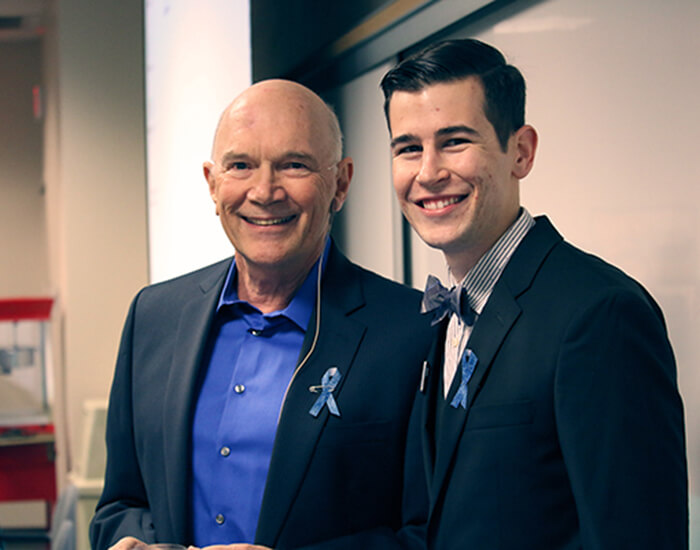In May 2015, 13 winners of the National Institute of Health's (NIH) Neuro StartUp Challenge were announced, including a team of researchers and entrepreneurs representing the California Institute of Technology (Caltech) in Pasadena, CA. This team, advised by KGI's Dr. Ian Phillips, received an award for their project titled "A method of treating an enzyme deficiency disorder which causes neurodegeneration with small molecule." More recently, the Caltech team also received FDA orphan drug designation for the use of their small molecule, N-tert (Butyl)hydroxylamine (NtBuHA), in treating a rare neuron-killing disease known as infantile neuronal ceroid lipofuscinosis (INCL) or infantile Batten disease.
Children affected by Batten disease present normally at birth, but succumb to psychomotor retardation around 11 to 18 months of age. As the disease progresses, neuronal death leads to complete blindness and degradation of brain activity until eventual death. An estimated 200 to 400 patients in the U.S. suffer from the disease, for which there is no current approved therapy. The Caltech team's chemical compound NtBuHA mimics the action of a key enzyme, palmitoyl-protein thioesterase-1, the deficiency of which causes the rare disease. Early-stage drug designation for NtBuHa, which currently has only pre-clinical animal study data, marks a major success for the team and the potential to develop the compound for use in other thioesterase deficiency disease therapeutic areas.
Says team member Samy Hamdouche: "Unfortunately, when most drug developers see extremely small patient population sizes, they assume there is no business opportunity. We outlined a plan that highlighted the unmet patient need and the opportunity for the NIH technology to address that unmet need. Additionally, we identified critical areas in which the technology could be de-risked where, if successful, substantial value would be created for both patients and investors. A critical aspect of our strategy was connecting the opportunity to positively impact the lives of patients with an investment opportunity."
The Neuro StartUp Challenge, created by the National Institutes of Health (NIH), sponsored by Health Provider Network (HPN), and orchestrated by The Center for Advancing Innovation (CAI), brought 70 teams together from around the world to develop therapeutics, devices, and diagnostic tests for neurological diseases. The CAI, recognizing the NIH's strict conflict of interest rules that prevented investigators from founding companies based on innovative, life-changing technologies, sought to work with the NIH to help entrepreneurs get their inventions commercialized and bring therapeutic new technologies and findings to market. Teams competed in two phases: Phase 1, which consisted of delivering an "elevator speech" and executive summary discussing each team's innovation, and Phase 2, which consisted of a business plan, financial model, and a 20-minute "live" pitch given through Skype. Projects were judged based on presentation, content, and persuasion by senior leaders of life sciences companies, research organizations, universities, and healthcare organizations from around the world.
Members of the winning team included recent Caltech graduates Samy Hamdouche (PhD, biology), Soyoung Park (PhD, neuroscience), Devin Wiley (MD, PhD), and Andrew Burns, lab coordinator at the Center for Rare Disease Therapies at KGI. Andrew has returned to KGI to pursue his Master of Science degree and finds his work on this project has brought a real-world perspective on the concepts he has learned through both business and science classes at KGI. "This project has certainly put my experience at the Center for Rare Disease Therapies to good use," says Andrew. "Having both taken and assisted Dr. Phillips' orphan drug class, I was able to get hands-on experience and use what I learned at KGI to help win a competition funded by an organization as powerful as the NIH." Andrew acted as a consultant for the Caltech team, participating in conference calls and assisting the team with how to write the orphan drug application. The orphan drug application was a critical factor in the team winning the competition.
Dr. Ian Phillips, KGI Norris Professor and director of the Center for Rare Disease Therapies, was part of Caltech's StartUp project since its initial stages when he served as a key opinion leader in rare diseases and was critical in shaping the team's overall strategy. Says Dr. Phillips, "I knew it would require a lot of work over several months, so I was glad to have Andrew actively participating in a national competition." Advising on this project allowed Dr. Phillips to come full circle: He spent several years as an instructor and fellow of Caltech's Division of Biology in the years following his postdoctoral work.
For more information about the competition, please visit: http://www.neurostartupchallenge.org/
The National Institutes of Health (NIH), part of the U.S. Department of Health and Human Services, is the nation's medical research agency. It is the largest source of funding for medical research in the world, committed to seek fundamental knowledge about the nature and behavior of living systems through the application of that knowledge to enhance health, lengthen life, and reduce illness and disability. The NIH encourages and depends on public involvement in federally supported research and activities, which include outreach and education, nationwide events, requests for public input on NIH projects, and special programs designed specifically to involve public representatives in clinical research. To learn more, please visit www.nih.gov.
The Center for Advancing Innovation (CAI) is a non-profit innovation accelerator, created to accelerate and improve the volume of knowledge and technology transfer, commercialization, and entrepreneurship, and assist partnering organizations in the most relevant ways. CAI's mission includes expanding access to research assets, improving their economic impact, advancing and institutionalizing relevant innovation and entrepreneurship, strengthening resilient and sustainable innovation, and enhancing innovation capability and awareness globally. To learn more, please visit www.thecenterforadvancinginnovation.org.
Heritage Provider Network (HPN) is a limited Knox-Keene organization in California that provides affordable quality care to its members. Through innovative programs and services designed specifically for the managed-care environment, HPN and its medical groups have been successful in delivering the goals it set out to achieve while establishing long-standing, favorable provider relationships. To learn more, please visit www.heritageprovidernetwork.com.
